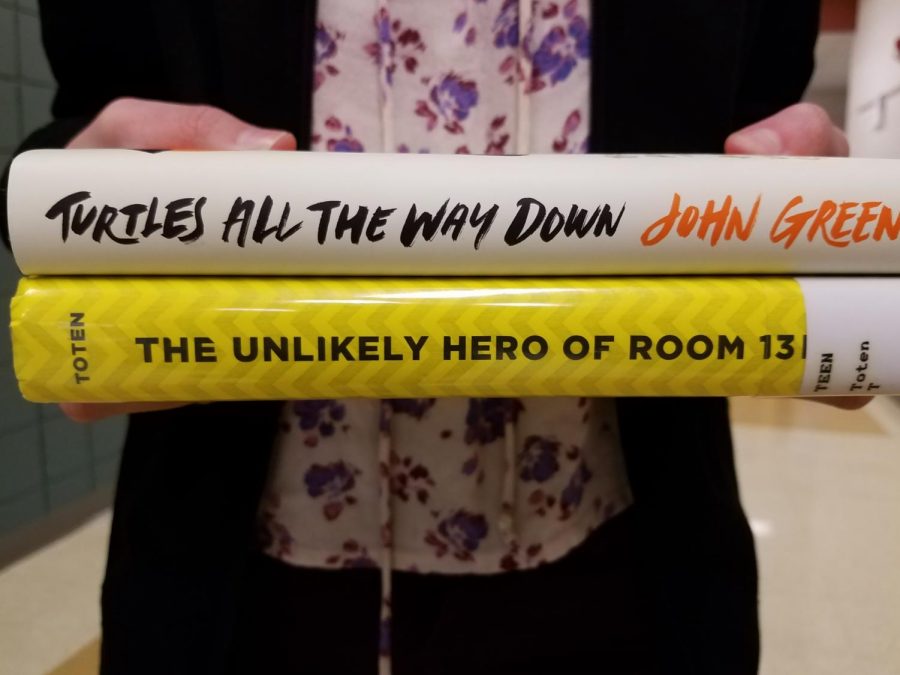Turtles All the Way Down by John Green and The Unlikely Hero of Room 13B by Teresa Toten both tell poignant stories about the realities of living with OCD. Photo Credit: Serena Bettis
Turtles All the Way Down by John Green
Though it would be false to say I rarely read books that have profound meaning to me (I read often and am picky about what I read), I have never read a book that so accurately describes a major part of my life as Turtles All the Way Down by John Green does. John Green’s most recent novel since the award-winning The Fault in Our Stars features Aza, a teen girl with obsessive compulsive disorder (OCD), as she battles her mental illness while embarking on adventures with her best friend, Daisy. Aza and Daisy find themselves reacquainted with a billionaire’s son, Davis, after Davis’ father disappears while his company is in the middle of a lawsuit. The novel then transitions between a mystery, romance, and coming-of-age story.
Turtles All the Way Down is probably my favorite John Green novel, and will remain that way for a long time. Unlike some of his other works, it has good elements of romance without being overly cheesy, and though the premise and setting are occasionally far-fetched (Davis’ house has a movie theatre hidden behind a bookshelf), the characters are as real as they get in Young Adult fiction. Moreover, Green did a fantastic job incorporating an major element of his own life into the novel (OCD) without making the novel a what-if memoir to his teenage self (Looking for Alaska, anyone?). I think that Green’s own personal experience with the type of OCD he gives to Aza is what mainly makes this book powerful.
While I do not suffer from OCD like Aza, I do experience generalized anxiety disorder, and was able to relate to Aza immediately as she explains the type of thought spirals she finds herself caught in. Green writes paragraphs of Aza’s thoughts, jumping first to Aza’s attempts at calming herself down and then to her anxiety-driven fears and urges shown in italics. I found these paragraphs simultaneously compelling and heart-wrenching as I could sympathize with Aza when she struggles with thoughts that are not truly her own. One thing this book still left me wishing for was a novel more focused on mental health recovery, and not on the downfall into the need for recovery. Aza’s OCD overtakes her at one point in the novel, but it takes most of the novel for her to get there and less of it than I hoped to see her come out of it. As per usual, Green is great at documenting drama and tragedy that make for fantastic movie adaptations – what I would like to see him do is write a book solely about redemption, where the good moments properly outweigh the bad.
Additionally, Green finds ways to put in large, bold statements about life and the world that are common for his books such as, “True terror isn’t being scared; it’s not having a choice in the matter.” This, along with a romance that leaves Aza thinking, “I thought, lying there, that I might love him for the rest of my life,” are some of my least favorite parts of the novel. Despite being a fan of Green’s books before the widespread popularity of The Fault in Our Stars, many critics of his work dampened my enjoyment of his novels when I had to agree that there is a certain amount of predictability in his writing. I hoped Turtles All the Way Down would thwart this, and it did in some respects, but also failed to in others.
I would certainly still recommend Turtles All the Way Down to anyone, especially readers wary of John Green. Despite its faults, it is primarily a story about Aza’s mental illness and how that affects her relationships with her peers, and is a worthwhile and accurate read if you are trying to understand how anxiety can impact someone’s life.
The Unlikely Hero of Room 13B by Teresa Toten
The Unlikely Hero of Room 13B by Teresa Toten is one of a multitude of mental health related books that have begun to appear on young adult library shelves. The main character, Adam Ross, struggles with Obsessive Compulsive Disorder. His five-year-old stepbrother, Sweetie, exhibits many of the same symptoms of anxiety and compulsions, as do the members of Adam’s support group.
The group’s supervisor and Adam’s therapist, Chuck, suggests the members of the group take on superhero personas when they are together to allow them to escape their own realities for a bit. Nicolas, a massive and silent college dropout, becomes Thor. Connie, a girl who struggles with food-related obsessions, becomes Wonder Woman. And the new girl in the room, Robyn Plummer, becomes Robin, the love of Adam’s, now Batman’s, life.
Batman’s life is far from perfect even when his mental illness is taken out of the picture. His parents are divorced, and while his dad has a sweet new wife and son, Adam’s mom is hoarding. His house is becoming fuller and fuller with bags of rice, National Geographic, and tupperware containers, and his mom insists that she’ll be taken away from him if he tells anyone.
Robin is his breath of fresh air. The moment he sees her, he stops counting odd numbers in his head and starts listing ways to get better. He vows to be her white knight, who will protect her from harm and make sure she can’t be hurt by anyone or anything. Robin is fascinated by his Catholicism and wants to learn everything about the religion, and so they spend hours together so she can ask questions.
Though part of the danger of the spike in mental health novels is stereotyping those who live with them, Toten does a spectacular job of crafting a character with OCD rather than a cliche. My own personal experiences with OCD around me made this book fascinating, as it felt real. The characters are diverse, each with a varied set of challenges and their own ways of managing them. Adam’s fellow superheroes lie to each other and fake how they are feeling, but ultimately support one another to the bitter end. Their friendship alone could make a great novel, as it is portrayed with all the ups and downs that come along with high schoolers.
At each meeting of Group, several members talk about what has been affecting them most and how it makes them feel. The way they respond and react to one another mimics the members of my own friend group, from the “patters” to the “sympathizers” to the ones who try to top the bad thing with something from their own life. Toten really gets inside the personalities of the teenagers, who have their own ever-changing crushes and arguments.
The romance between Adam and Robin is a major element in the book, but it never feels forced or like a trope. Adam struggles with the same nervous “will she like me back?” as anyone, but is simultaneously convinced that something terrible will happen to her if he lets on that he can’t walk through his own front door. There is a clear mystery subplot to the story relating to Adam’s mother as well, which adds another non-conventional element.
Adam’s rituals, including counting, tapping, and ordering, provide any reader who wants to better understand OCD with a look inside the thoughts of a teenager dealing with it. His threshold issues, for example, mean that he believes that something terrible will happen to his family if he doesn’t first perform a complicated “clearing” ritual before entering a doorway. Though he knows that that is irrational, he simply cannot bring himself to walk through without breaking down into nausea and panicking.
The culmination of the story didn’t feel rushed, despite the large number of events that occur rapidly. The elements of the story aren’t tied up too neatly, which leaves the reader with a distinct understanding that life doesn’t always have a perfect ending. The Unlikely Hero of Room 13B will relate to any high schooler is the search for happiness, whatever their roadblocks to it may be. Ultimately, it explains that one cannot go through life alone. Reaching out to the people one loves is the only way to live life is the way it is meant to be lived.

